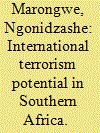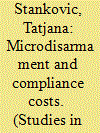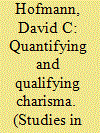|
|
|
Sort Order |
|
|
|
Items / Page
|
|
|
|
|
|
|
| Srl | Item |
| 1 |
ID:
140780


|
|
|
|
|
| Summary/Abstract |
The domestic far-right movement has existed in the United States for many years. During that time, groups have appeared, disappeared, and reappeared. Unfortunately, very little is known about what causes these groups to disband. An interdisciplinary approach identified external and internal correlates of organizational death to empirically test which of these correlates influences whether a group dies. Results from this study provided empirical support for some previously only anecdotal explanations for organizational death, while also undermining other claims.
|
|
|
|
|
|
|
|
|
|
|
|
|
|
|
|
| 2 |
ID:
140783


|
|
|
|
|
| Summary/Abstract |
This article discusses the potential factors for the development of international terrorism in southern Africa. While the region has seemingly been spared the terror attacks that have ravaged most other parts of the continent, and the globe at large, it is not immune to these attacks. Using a survey of the Southern African Development Community (SADC) countries, particularly the Democratic Republic of the Congo, Mozambique, South Africa, Mauritius, Zimbabwe, and Tanzania, which illuminate some of the permissive factors, the article asks, largely, first, to what extent is southern Africa at risk of global terrorism? And, second, in what ways can southern African states reduce the risk of terrorism in the region? Broadly, the article contends that, like most developing countries, including those from other parts of Africa, there exist permissive, both root and trigger, factors including insecure borders, democratization challenges, poverty, urban centers and variegated forms of both sub-state and state terrorism, that could provide useful platforms for the growth of international terrorism.
|
|
|
|
|
|
|
|
|
|
|
|
|
|
|
|
| 3 |
ID:
140782


|
|
|
|
|
| Summary/Abstract |
The following article is divided into two parts, each offering a series of propositions highlighting the effects and implications of organizational naming and labeling practices and their subsequent effects on the framing of terrorist organizations and activity. In the first half, the author will highlight the importance of organizational naming and labeling in terms of how it shapes terrorism discourse. Then, the author will discuss the importance of recognizing the implications of how the events of 11 September 2001 were framed by then president George W. Bush. Important to both discussions is the relevance of organizational communication theory, particularly in terms of individual sensemaking and the communicative constitution of organizations.
|
|
|
|
|
|
|
|
|
|
|
|
|
|
|
|
| 4 |
ID:
140778


|
|
|
|
|
| Summary/Abstract |
Focusing on disarmament, demobilization, and reintegration programs, this article considers why some armed groups disarm and demobilize, while others refuse to do so. Previous research focused on intergroup rivalries and identified enforcement as a critical barrier. This study considers the effect of (1) war benefits and (2) intragroup dynamics and argues that distribution problems obstruct conflict resolution. Using a simple game-theoretic model, the article demonstrates that optimal programs (1) consider that combatants' cost of supporting peace varies and (2) require a mix of positive and negative incentives to motivate all ex-combatants to participate and comply with program requirements.
|
|
|
|
|
|
|
|
|
|
|
|
|
|
|
|
| 5 |
ID:
140779


|
|
|
|
|
| Summary/Abstract |
In the past four decades, there has been increased multidisciplinary scholarly interest in the study of charismatic authority. However, there has yet to be any systematic examination of charismatic authority in the context of terrorism, despite widespread acknowledgment of the importance of charismatic leaders in the recruitment, radicalization, and operation of terrorist groups. This article seeks to contribute to future empirical research by presenting a theoretical framework for measuring the presence of charismatic authority in terrorist groups that is based on Max Weber's seminal work on legitimate domination (herrschaft) and on theoretical insights drawn from the study of charismatic authority in new religious movements. The framework is then applied to an illustrative case study of the relationship between charismatic authority and the radicalization process within the far-right terrorist group “the Covenant, the Sword, and the Arm of the Lord.” The article concludes with a discussion of findings and suggestions for future research.
|
|
|
|
|
|
|
|
|
|
|
|
|
|
|
|
|
|
|
|
|